Innovative, Individualized Cancer Care | Burzynski Clinic
Jul 28, 2025 | By: Burzynski Clinic
Over 1.7 million people in the U.S. are diagnosed with cancer each year, yet less than half receive personalized treatment tailored to their needs. Hope should be grounded in innovation. This blog explores the importance of personalized cancer therapies, how compassionate care and groundbreaking treatments drive healing, and why targeting cancer at its molecular level is crucial.
Understanding Cancer: A Complex Disease
Cancer is not a single disease but a complex collection of related diseases characterized by the uncontrolled division of abnormal cells. According to the National Cancer Institute, there are more than 100 types of cancer, each with its unique behavior and response to treatment. This complexity necessitates a new way of viewing treatment options—one that goes beyond conventional approaches.
In traditional cancer care, one-size-fits-all protocols can leave patients feeling hopeless. At the Burzynski Clinic, treatments are personalized based on each patient’s unique genetic and molecular profile, offering a more targeted and hopeful approach in the evolving field of cancer care.
The Rise of Personalized Cancer Care
Personalized cancer care works on the principle that every tumor is unique, necessitating treatment plans that cater specifically to the individual's molecular profile. Dr. Burzynski believes this innovative approach involves evaluating the genetic, environmental, and lifestyle factors that contribute to a person's cancer.
1. Genomic Profiling: At the heart of personalized medicine is genomic profiling, which identifies specific mutations and changes in cancer DNA. This information enables oncologists to choose therapies that are more likely to be effective for each patient.
2. Targeted Therapies: Based on the genomic analysis, targeted therapies can be administered that specifically attack cancer cells without harming normal cells. Antineoplaston therapy, developed by Dr. Stanislaw Burzynski, seeks to exploit these genetic differences, potentially offering groundbreaking results.
3. Monitoring and Adjusting Treatment Plans: Continuous monitoring of patient response allows for real-time adjustments to treatment plans, ensuring that the most effective strategies are being implemented.
Antineoplaston Therapy: A Beacon of Hope
Antineoplaston therapy is unique to the Burzynski Clinic, wherein the therapy uses naturally occurring compounds called antineoplastons that help regulate cell growth and promote healing. This innovative therapy targets cancer at a molecular level, offering independent support for various types of cancer, such as brain tumors, leukemias, and others. Antineoplastons may help restore normal cellular functions while navigating the balance of patient health and wellbeing.
The development of these therapies highlights the importance of science in addressing cancer, but coupled with compassion and individualized care, the results have been promising. Patients often find their journeys more bearable with personalized support and nutritional counseling integrated into their cancer care plan.
The Role of Nutrition in Cancer Treatment
Nutritional counseling is an essential component of tailored cancer treatment, as it can significantly affect recovery and overall health. A well-rounded diet can boost the immune system, speed up recovery times, and improve the patient's quality of life. Key nutritional elements include:
- Proteins: Essential for repairing tissues, proteins can be found in lean meats, fish, eggs, and legumes.
- Healthy Fats: Incorporating omega-3 fatty acids found in fish and nuts can help reduce inflammation.
- Vitamins and Minerals: Foods rich in antioxidants—such as fruits and vegetables—are critical for combating oxidative stress caused by cancer treatments.
Patients at the Burzynski Clinic receive specialized nutritional advice tailored to their treatment plans, encouraging holistic recovery and well-being through diet.
Addressing Emotional and Psychological Needs
Beyond physical ailments, battling cancer can significantly affect mental health. Therefore, empathetic and compassionate care forms the backbone of the Burzynski Clinic model. Dr. Burzynski believes that incorporating psychological support into treatment can enhance patient resilience, helping them to cope with the myriad of feelings that arise from a cancer diagnosis.
- Counseling Services: Access to mental health professionals allows patients to process their diagnosis and treatment, providing emotional support and coping strategies.
- Support Groups: Engaging with peers who understand the challenges of cancer can foster a sense of belonging and community.
A New Dawn in Cancer Care
The future of cancer treatment lies in personalized care tailored to you, not just the disease. Dr. Burzynski at the Burzynski Clinic in Houston is leading the way with innovative therapies and a holistic approach that considers your physical, emotional, and nutritional needs. Cancer care isn’t just about hope—it’s about a structured, compassionate plan for healing.
Take the first step toward a personalized treatment plan today—schedule your appointment at the Burzynski Clinic.

